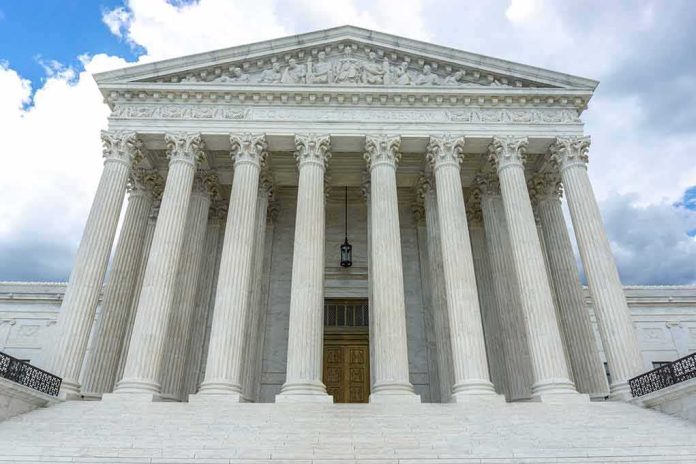
Supreme Court rejects appeal of conservative teacher Kari MacRae who was fired over social media posts expressing opposition to transgenderism and illegal immigration, effectively sanctioning the school district’s right to terminate educators for private political speech.
Key Takeaways
- The Supreme Court declined to hear a case from teacher Kari MacRae who claimed she was fired over political social media posts made before her employment began
- Justice Clarence Thomas criticized lower courts for misapplying First Amendment precedents in cases involving controversial political speech
- MacRae was terminated after posting TikTok memes about transgenderism, immigration, and other conservative viewpoints
- The decision establishes a concerning precedent that may limit educators’ freedom of expression outside the classroom
- Conservative legal group Judicial Watch expressed disappointment over the court’s decision not to hear the case
Constitutional Rights Versus School District Powers
In a troubling blow to free speech rights, the Supreme Court has refused to hear the case of Kari MacRae, a Massachusetts teacher who was fired from her position at Hanover Public Schools after school officials discovered TikTok videos she had posted expressing conservative views on transgenderism and immigration. The videos in question were created before she was even hired, yet the school district claimed her viewpoints constituted “conduct unbecoming a teacher” and terminated her employment during her probationary period. The court’s decision to pass on this case effectively allows the lower court ruling against MacRae to stand, setting a dangerous precedent for educators nationwide.
“The Supreme Court on Monday declined to hear arguments in a case involving a teacher who claims she was fired over social media posts expressing her views on transgenderism, immigration, and other controversial issues,” said Justice Clarence Thomas.
While the court’s decision not to hear the case doesn’t constitute an endorsement of the firing, it does leave in place a concerning First Circuit Court of Appeals ruling that effectively prioritized a school district’s vague concerns about “disruption” over a teacher’s constitutional right to express personal political views outside the classroom. This outcome raises serious questions about whether public employees, particularly educators, can be terminated simply for expressing conservative viewpoints that run counter to increasingly dominant progressive ideologies in educational institutions.
Justice Thomas Raises Alarm Over First Amendment Implications
In a rare move highlighting the significance of this case, Justice Clarence Thomas issued a statement criticizing the lower courts’ handling of MacRae’s First Amendment claims. Thomas argued that the First Circuit Court of Appeals fundamentally misapplied the balancing test established in previous Supreme Court decisions for evaluating public employees’ free speech rights. According to Thomas, the lower court gave insufficient weight to MacRae’s constitutional protections while overstating the school district’s interest in limiting her speech, which had occurred outside of school and before her employment began.
The case’s rejection by the Supreme Court hinged on a technical aspect of MacRae’s legal strategy. Her attorneys at Judicial Watch argued that the traditional balancing test for public employee speech should not apply to her situation at all, effectively asking the court to overrule or significantly modify previous precedents. This approach, while bold, likely reduced her chances of having the case accepted for review, as the Supreme Court typically prefers cases that apply existing legal frameworks rather than seeking to overturn them entirely.
Broader Implications for Conservative Educators
MacRae’s case exemplifies the growing challenges conservative educators face in a profession increasingly dominated by progressive ideology. Her social media posts, which included statements opposing the teaching of critical race theory and expressing concerns about biological males competing in women’s sports, represented mainstream conservative positions held by millions of Americans. Yet these views were deemed sufficient grounds for termination by school administrators, who claimed her opinions would prevent her from creating an “inclusive” environment for students, despite no evidence that her personal views affected her classroom performance.
“The Supreme Court’s decision not to take up her case is a missed opportunity to uphold the First Amendment,” said Tom Fitton.
Despite this legal setback, MacRae has remained politically engaged, running unsuccessfully for Massachusetts state Senate twice and planning another campaign in 2026. Her persistence highlights the importance of maintaining conservative voices in both education and politics, especially in regions where progressive ideologies dominate public institutions. The court’s refusal to hear her case stands as a stark reminder of the ongoing battle to protect free speech rights for all Americans, particularly those who express views contrary to prevailing left-wing orthodoxies in educational settings.







